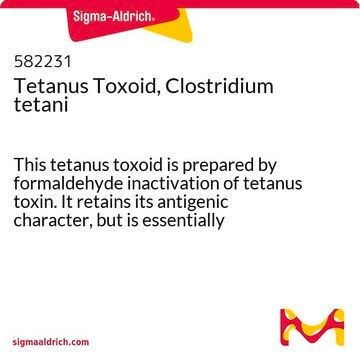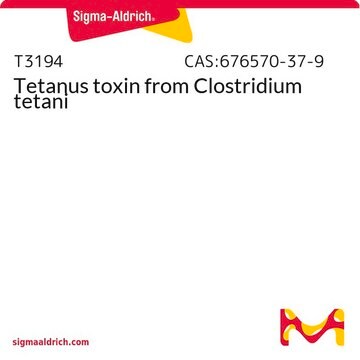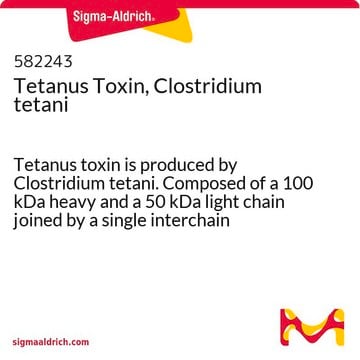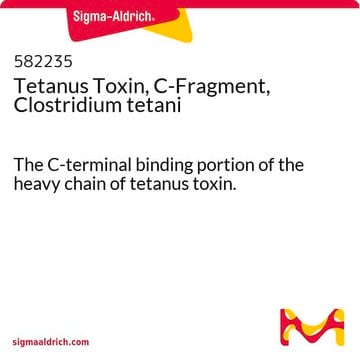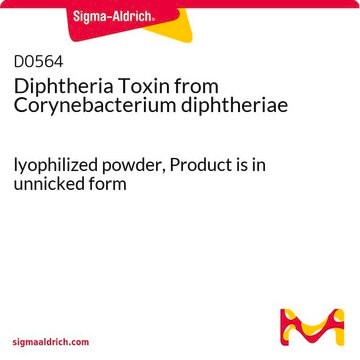T3694
Tetanus toxin C fragment from Clostridium tetani
Synonym(e):
TTC
Anmeldenzur Ansicht organisationsspezifischer und vertraglich vereinbarter Preise
Alle Fotos(1)
About This Item
Empfohlene Produkte
Allgemeine Beschreibung
Tetanus toxin C fragment (TTC) is a non-toxic peptide, which is transported from peripheral axons into spinal motoneurons. It provides protection for motoneurons (MN) in the spinal cord in vivo. TTC regulates membrane binding, internalization and retrograde transport within MN. It initiates neurotrophin-regulated signaling pathways in a Trk receptor-dependent manner. TTC has neuroprotective property in primary cerebellar granule cell culture.
Anwendung
The C terminal binding portion of tetanus toxin is not toxic but is taken up by pre-synaptic nerve terminals and exhibits trans-synaptic retrograde transport in central neurons similar to that of tetanus toxin. It is used to map neuronal connections and to target proteins to neurons.
Biochem./physiol. Wirkung
Tetanus toxin is a neurotoxin that comprises of a heavy and a light chain linked by disulfide bridges. This neurotoxin enters the cytoplasm and releases the light chain component that subsequently inhibits the release of neurotransmitters2. Studies have reported that the fragment C of tetanus toxin retains most of the determinants that interact with thyroid membranes, gangliosides and neural membranes3.
Rekonstituierung
Each vial, when reconstituted with 50 μl of sterile distilled water, contains 10 μg of tetanus toxin C-fragment in 0.01 M sodium phosphate, pH 7.5. To aid recovery, 0.1% albumin may be added.
Signalwort
Danger
H-Sätze
Gefahreneinstufungen
Acute Tox. 1 Oral - Acute Tox. 2 Inhalation - STOT SE 1
Zielorgane
Central nervous system
Lagerklassenschlüssel
6.1A - Combustible acute toxic Cat. 1 and 2 / very toxic hazardous materials
WGK
WGK 3
Flammpunkt (°F)
Not applicable
Flammpunkt (°C)
Not applicable
Hier finden Sie alle aktuellen Versionen:
Analysenzertifikate (COA)
Lot/Batch Number
Die passende Version wird nicht angezeigt?
Wenn Sie eine bestimmte Version benötigen, können Sie anhand der Lot- oder Chargennummer nach einem spezifischen Zertifikat suchen.
Besitzen Sie dieses Produkt bereits?
In der Dokumentenbibliothek finden Sie die Dokumentation zu den Produkten, die Sie kürzlich erworben haben.
Kunden haben sich ebenfalls angesehen
Tetanus toxin C-fragment protects against excitotoxic spinal motoneuron degeneration in vivo
Netzahualcoyotzi C and Tapia R
Scientific Reports, 8(1), 16584-16584 (2018)
T B Helting et al.
The Journal of biological chemistry, 252(1), 187-193 (1977-01-10)
Tetanus toxin was digested with papain, yielding one major polypeptide (Fragment C) with a molecular weight corresponding to 47,000 +/- 5%, thus comprising about one-third of the toxin molecule. Fragment C was antigenically active, atoxic, and stimulated the formation of
E Link et al.
Biochemical and biophysical research communications, 189(2), 1017-1023 (1992-12-15)
Tetanus toxin is a potent neurotoxin that inhibits the release of neurotransmitters from presynaptic nerve endings. The mature toxin is composed of a heavy and a light chain that are linked via a disulfide bridge. After entry of tetanus toxin
Interaction of fragments B and C of tetanus toxin with neural and thyroid membranes and with gangliosides.
N P Morris et al.
The Journal of biological chemistry, 255(13), 6071-6076 (1980-07-10)
Unser Team von Wissenschaftlern verfügt über Erfahrung in allen Forschungsbereichen einschließlich Life Science, Materialwissenschaften, chemischer Synthese, Chromatographie, Analytik und vielen mehr..
Setzen Sie sich mit dem technischen Dienst in Verbindung.